Description:
Venice: Giunta (colophon: in officina haeredum Lucaeantonii Iunctae), 1563. Leather. Very Good. Folio (38 cm); [2], 152, 12 leaves. Text in two columns, printed in red and black ink. Printer's device in red on title page (Camerini, I, 143, third variant). About 99 woodcut illustrations in text (some repeated), including full-page crucifixion, repeated seven times, and 10-panel historiated woodcut border to facing page, also repeated seven times. Rotunda, roman, and italic type. Music with notes in black on red staves. Bound in paneled calf, roughly contemporary, ruled in gilt with gilt fleurs-de-lis at corners. Binding worn with signs of old repairs. Text toned on some leaves, but remarkably fresh and free of blemishes overall. References: Mortimer, Italian, 304; Amiet, Repertorium, 2:101; Camerini, 673; RELICS, 2859. In the 1560s, the brothers Tommaso and Giovan Maria Giunta were trying to recover financially from the fire that destroyed their Venice workshop in 1557. Taking few…
Read More ... De duplici copia, verborum ac rerum commentarij duo, by Erasmus, Desiderius - 1514-1515: Item Epistola ... ad Iacobum Vuymphelingium Selestatinum. Item ... Parabolae, siue similia, e Physicis, pleraque ex Aristotele, & Plinio. [BOUND WITH] Collectanea Adagiorum veterum ... [1515].
by Erasmus, Desiderius
Similar copies are shown below.
Similar copies are shown to the right.

... De duplici copia, verborum ac rerum commentarij duo,: Item Epistola ... ad Iacobum Vuymphelingium Selestatinum. Item ... Parabolae, siue similia, e Physicis, pleraque ex Aristotele, & Plinio. [BOUND WITH] Collectanea Adagiorum veterum ... [1515].
by Erasmus, Desiderius
- Used
- very good
- Hardcover
- first
Strasbourg: Matthias Schürer, 1514-1515. First edition of some material. Hard Cover. Very Good. Quarto (21 cm), three parts in one volume: I: [6], 73, [6] leaves; II: [56] leaves; III: [4], 57, [7] leaves. Numerous five- and six-line "criblé" woodcut initials on black ground decorated with arabesques and figures, many of them carefully rubricated. Second title page with woodcut architectural border, lightly rubricated. Printer's "usui studiosorum" device on last printed page, rubricated. Bound in contemporary or 17th-century blind-stamped alum tawed pigskin over wooden boards, with a Cardinal's arms gilt on both boards. Clasps and catches preserved, straps renewed. Some small worming at spine ends. First title leaf somewhat toned and soiled. Occasional marginalia in contemporary or early hand. Contemporary ownership inscription on title page. References: VD 16 E-2645 and E-3237; Adams E-318 and E-716; Panzer VI, 68, 340-341; "Early Editions" (Toronto) #369, etc.
Several related works of Erasmus collected in one binding, including the first edition of Parabolae sive similia (a reported 1513 edition of Parabolae was a longstanding bibliographical error), and the first appearance of Erasmus's farewell letter to Jakob Wimpfeling (Epistle 305). In 1509, the year Mattias Schürer completed his apprenticeship and opened his own print shop, he struck an unauthorized edition of Erasmus's Adagia, purloined from the first edition of 1500. Anger on the author's part would have been justified. Yet, in spite of this commercial indiscretion, Erasmus favored Schurer with a warm, supportive, and lasting friendship. In October, 1514, he gave Schürer the manuscript of "Parabolae, sive similia," which Schürer decided to publish in tandem with a reprint of De Copia (although there are copies extant of Parabolae bound alone). It is fitting that Parabolae should be bound with Adagia in this copy, since it expands on the earlier work's idea of compiling classical maxims. Parabolae (that is, The Parables) is a catalogue of didactic similes gleaned from Plutarch, Seneca, and Pliny (who almost never used similes in his own text). The Adagia is also the subject of Erasmus's letter to Wimpfeling, whom he thanks for recommending it for a school text. Schürer's edition of Adagia of 1515 is the first to contain the printer's own "table of proverbs" to function as a key to the collection. In all, Schürer published 57 editions of 15 titles by Erasmus in the five year period from 1514 to 1519, the year he died.
Several related works of Erasmus collected in one binding, including the first edition of Parabolae sive similia (a reported 1513 edition of Parabolae was a longstanding bibliographical error), and the first appearance of Erasmus's farewell letter to Jakob Wimpfeling (Epistle 305). In 1509, the year Mattias Schürer completed his apprenticeship and opened his own print shop, he struck an unauthorized edition of Erasmus's Adagia, purloined from the first edition of 1500. Anger on the author's part would have been justified. Yet, in spite of this commercial indiscretion, Erasmus favored Schurer with a warm, supportive, and lasting friendship. In October, 1514, he gave Schürer the manuscript of "Parabolae, sive similia," which Schürer decided to publish in tandem with a reprint of De Copia (although there are copies extant of Parabolae bound alone). It is fitting that Parabolae should be bound with Adagia in this copy, since it expands on the earlier work's idea of compiling classical maxims. Parabolae (that is, The Parables) is a catalogue of didactic similes gleaned from Plutarch, Seneca, and Pliny (who almost never used similes in his own text). The Adagia is also the subject of Erasmus's letter to Wimpfeling, whom he thanks for recommending it for a school text. Schürer's edition of Adagia of 1515 is the first to contain the printer's own "table of proverbs" to function as a key to the collection. In all, Schürer published 57 editions of 15 titles by Erasmus in the five year period from 1514 to 1519, the year he died.
-
Bookseller
Rodger Friedman Rare Book Studio
(US)
- Format/Binding Hard Cover
- Book Condition Used - Very Good
- Quantity Available 1
- Edition First edition of some material
- Binding Hardcover
- Publisher Matthias Schürer
- Place of Publication Strasbourg
- Date Published 1514-1515
- Keywords Adagia De Copia Parabolae Jakob Wimpfeling
We have 6 copies available starting at SGD 57.96.

More Photos
Missae episcopales pro sacris ordinibus conferendis: secundum ritu[m] sacrosancte Romane Ecclesie ....
by Machabaeus, Hieronymus.
- Used
- very good
- Hardcover
- Condition
- Used - Very Good
- Binding
- Hardcover
- Quantity Available
- 1
- Seller
-
Tuxedo Park, New York, United States
- Item Price
-
SGD 6,896.50
Show Details
Item Price
SGD 6,896.50

More Photos
A DIALOGUE BETWEENE EXPERIENCE AND A COURTIER, OF THE MISERABLE STATE OF THE WORLDE
by LINDSAY, DAVID
- Used
- Condition
- Used
- Binding
- Unknown
- Quantity Available
- 1
- Seller
-
McMinnville, Oregon, United States
- Item Price
-
SGD 15,779.19
Show Details
Description:
London: Thomas Purfoote, 1581. 188 x 144 mm. (7 1/2 x 5 5/8"). 4 p.l., 140 (i.e., 148) leaves. Pleasant 19th century black crushed morocco by Riviere and Son (stamp-signed in gilt on front turn-in), covers with panels framed by blind and gilt rules, gilt trefoil tool and anular dot at each corner, raised bands, spine in gilt-ruled compartments with trefoil centerpiece, gilt titling, gilt-ruled turn-ins, all edges gilt. Title within ornamental border, small decorative woodcut initials. Printed in black letter type. Front pastedown with bookplate of Robert S. Pirie; front free endpaper with armorial bookplate of Sir Richard Newdigate dated 1709; a few pages with ink annotations in a contemporary hand. STC 15678; ESTC S108560. See also: Longman, "Bibliotheca Anglo-poetica," pp. 190-92. ◆Corners slightly rubbed, top margin trimmed a bit close, occasionally touching running title, leaves just a shade less than bright, a few spots of foxing and soiling, otherwise an excellent copy--with few signs of…
Read More Item Price
SGD 15,779.19

More Photos
Der Architectur furnembsten, notwendigsten, angehörigen Mathematischen und Mechanischen künst, eygentlicher bericht, und verstendliche unterrichtung, zu rechtem verstandt der lehz Vitruvii, in drey fürneme Bücher abgetheilet. Als Der newen Perspectiua... - [RENAISSANCE MATHEMATICS AND MECHANICS]
by RYFF, W. H. (RIVIUS, WALTHER HERMENIUS).
- Used
- Condition
- Used
- Binding
- Unknown
- Quantity Available
- 1
- Seller
-
Copenhagen, Denmark
- Item Price
-
SGD 18,477.50
Show Details
Description:
1558. Nürmberg, Gabriel Heyn, 1558. Folio. Bound in a nice later (around 1840) hcalf. Raised double bands. Gilt spine. Gilt lettering. Marbled endpapers. Stamps on foot of title-page. A sort of frontispiece (full-page) is printed on the verso of the title-page, depicting the Putto as the spirit of architecture.Title-page printed in red and black. Dedication and content (4 unnumb.lvs.) - Geometry & Perspective (Ff I-C ) - Geometrischen Büchsenmeisterei (Ff I-XLVIII.) - Befestigung (Ff I-XLIIII ) - Geometrischen Messung (Ff (4),I-XLVI,(3)) - Wag und Gewicht (Ff I-XVII) - Schnelwagen (Ff I-X) ending with colophon and woodcut printer's device. Having more than 300 (many full- and half page) fine wood-engravings executed by V. Solis, G. Pencz, H. Brosamer and Peter Floetner. Internally in extraordinary fine clean condition with only a few minor scattered brownspots. 3 leaves with a minor repair to upper right corner. Scarce second edition (the first 1547) of this profusely illustrated encyclopedia of…
Read More Item Price
SGD 18,477.50

More Photos
Opera di agricoltura: nela q[ua]l si co[n]tiene a che modi si debbe coltivar la terra....
by Crescenzi, Pietro de' (1233-1320).
- Used
- good
- Hardcover
- Signed
- first
- Condition
- Used - Good
- Binding
- Hardcover
- Quantity Available
- 1
- Seller
-
Tuxedo Park, New York, United States
- Item Price
-
SGD 2,206.88
Show Details
Description:
Venice: Bernardino de' Viani, 1538. Good. Octavo (17 cm); [784] pages (signed A-BBB\8, plus index signed with maltese cross\8). One full-page woodcut illustration within patterned border. Floral border around title (at the top of which is a cat and mouse, similar to the image used by Sessa), and floriated initials at the beginning of each of the 12 books. Modern vellum binding, reusing an 18th-century morocco label; tail edge of text block titled in contemporary manuscript. Title with small oil stain transferring to following several leaves until disappearing at the fifth leaf, outer conjugate of first and last gatherings guarded, last leaf extended at fore-margin with Japanese mending tissue. Good, crisp copy. A sixteenth-century Italian translation of "Ruralia commoda," one of very few treatises on agronomy to appear during the Middle Ages, and the first printed modern text on agriculture when it was published in 1471. The book's enormous influence over Italian agriculture is evident even…
Read More Item Price
SGD 2,206.88

More Photos
Delle nozze,: trattato del Fausto da Longiano, in cui si leggono i riti, i costumi, gl'instituti, le cerimonie, et le solennità di diversi antichi popoli, onde si sono tratti molti problemi; & aggiuntivi, i precetti matrimoniali di Plutarco
by Fausto da Longiano, Sebastiano; Plutarch.
- Used
- very good
- Hardcover
- first
- Condition
- Used - Very Good
- Edition
- First edition
- Binding
- Hardcover
- Quantity Available
- 1
- Seller
-
Tuxedo Park, New York, United States
- Item Price
-
SGD 3,034.46
Show Details
Description:
Venice: Plinio Pietrasanta, 1554. First edition. Very Good. Quarto (22 cm); 45, [3] pages (last leaf blank). Title within woodcut architectural border. Historiated woodcut initials throughout. In half vellum over 17th- or 18th-century woodblock printed paste paper, titled in manuscript on spine. Lower board ruptured near corner, subsequently rebuilt. Some leaves toned brown. Early ownership inscriptions and later bibliographical notes on front free endpaper and on rear pastedown. References: Adams F-182; Olschki, Choix de livres anciens, VI, 5817 This essay extolling marriage is an early artifact of modern ethnography, in that it poses as a survey of marriage customs through history and around the world. In true humanist fashion, Fausto mines the ancient historians for most of his material. So we find out that in Lacedaemonia (or, Atlantis), men who refused to marry were forced to run naked through the forum in the dead of winter, and that in Assyria, husbands were bound by law to obey…
Read More Item Price
SGD 3,034.46

The Heretical Imperative: Contemporary Possibilities of Religious Affirmation
by Peter L. Berger
- Used
- Paperback
- first
- Condition
- Used - Very Good+
- Edition
- First edition
- Binding
- Paperback
- ISBN 13
- 9780385159678
- ISBN 10
- 0385159676
- Quantity Available
- 1
- Seller
-
Palm Desert, California, United States
- Item Price
-
SGD 34.48
Show Details
Description:
This used paperback book is in very good condition. The pages are clean and neat. The binding is tight. The boards are clean inside and out.
Item Price
SGD 34.48

More Photos
Missae episcopales pro sacris ordinibus conferendis: secundum ritu[m] sacrosancte Romane Ecclesie ....
by Machabaeus, Hieronymus.
- Used
- very good
- Hardcover
- Condition
- Used - Very Good
- Binding
- Hardcover
- Quantity Available
- 1
- Seller
-
Tuxedo Park, New York, United States
- Item Price
-
SGD 6,896.50
Show Details
Description:
Venice: Giunta (colophon: in officina haeredum Lucaeantonii Iunctae), 1563. Leather. Very Good. Folio (38 cm); [2], 152, 12 leaves. Text in two columns, printed in red and black ink. Printer's device in red on title page (Camerini, I, 143, third variant). About 99 woodcut illustrations in text (some repeated), including full-page crucifixion, repeated seven times, and 10-panel historiated woodcut border to facing page, also repeated seven times. Rotunda, roman, and italic type. Music with notes in black on red staves. Bound in paneled calf, roughly contemporary, ruled in gilt with gilt fleurs-de-lis at corners. Binding worn with signs of old repairs. Text toned on some leaves, but remarkably fresh and free of blemishes overall. References: Mortimer, Italian, 304; Amiet, Repertorium, 2:101; Camerini, 673; RELICS, 2859. In the 1560s, the brothers Tommaso and Giovan Maria Giunta were trying to recover financially from the fire that destroyed their Venice workshop in 1557. Taking few…
Read More Item Price
SGD 6,896.50

More Photos
A DIALOGUE BETWEENE EXPERIENCE AND A COURTIER, OF THE MISERABLE STATE OF THE WORLDE
by LINDSAY, DAVID
- Used
- Condition
- Used
- Binding
- Unknown
- Quantity Available
- 1
- Seller
-
McMinnville, Oregon, United States
- Item Price
-
SGD 15,779.19
Show Details
Description:
London: Thomas Purfoote, 1581. 188 x 144 mm. (7 1/2 x 5 5/8"). 4 p.l., 140 (i.e., 148) leaves. Pleasant 19th century black crushed morocco by Riviere and Son (stamp-signed in gilt on front turn-in), covers with panels framed by blind and gilt rules, gilt trefoil tool and anular dot at each corner, raised bands, spine in gilt-ruled compartments with trefoil centerpiece, gilt titling, gilt-ruled turn-ins, all edges gilt. Title within ornamental border, small decorative woodcut initials. Printed in black letter type. Front pastedown with bookplate of Robert S. Pirie; front free endpaper with armorial bookplate of Sir Richard Newdigate dated 1709; a few pages with ink annotations in a contemporary hand. STC 15678; ESTC S108560. See also: Longman, "Bibliotheca Anglo-poetica," pp. 190-92. ◆Corners slightly rubbed, top margin trimmed a bit close, occasionally touching running title, leaves just a shade less than bright, a few spots of foxing and soiling, otherwise an excellent copy--with few signs of…
Read More Item Price
SGD 15,779.19

More Photos
Der Architectur furnembsten, notwendigsten, angehörigen Mathematischen und Mechanischen künst, eygentlicher bericht, und verstendliche unterrichtung, zu rechtem verstandt der lehz Vitruvii, in drey fürneme Bücher abgetheilet. Als Der newen Perspectiua... - [RENAISSANCE MATHEMATICS AND MECHANICS]
by RYFF, W. H. (RIVIUS, WALTHER HERMENIUS).
- Used
- Condition
- Used
- Binding
- Unknown
- Quantity Available
- 1
- Seller
-
Copenhagen, Denmark
- Item Price
-
SGD 18,477.50
Show Details
Description:
1558. Nürmberg, Gabriel Heyn, 1558. Folio. Bound in a nice later (around 1840) hcalf. Raised double bands. Gilt spine. Gilt lettering. Marbled endpapers. Stamps on foot of title-page. A sort of frontispiece (full-page) is printed on the verso of the title-page, depicting the Putto as the spirit of architecture.Title-page printed in red and black. Dedication and content (4 unnumb.lvs.) - Geometry & Perspective (Ff I-C ) - Geometrischen Büchsenmeisterei (Ff I-XLVIII.) - Befestigung (Ff I-XLIIII ) - Geometrischen Messung (Ff (4),I-XLVI,(3)) - Wag und Gewicht (Ff I-XVII) - Schnelwagen (Ff I-X) ending with colophon and woodcut printer's device. Having more than 300 (many full- and half page) fine wood-engravings executed by V. Solis, G. Pencz, H. Brosamer and Peter Floetner. Internally in extraordinary fine clean condition with only a few minor scattered brownspots. 3 leaves with a minor repair to upper right corner. Scarce second edition (the first 1547) of this profusely illustrated encyclopedia of…
Read More Item Price
SGD 18,477.50

More Photos
Opera di agricoltura: nela q[ua]l si co[n]tiene a che modi si debbe coltivar la terra....
by Crescenzi, Pietro de' (1233-1320).
- Used
- good
- Hardcover
- Signed
- first
- Condition
- Used - Good
- Binding
- Hardcover
- Quantity Available
- 1
- Seller
-
Tuxedo Park, New York, United States
- Item Price
-
SGD 2,206.88
Show Details
Description:
Venice: Bernardino de' Viani, 1538. Good. Octavo (17 cm); [784] pages (signed A-BBB\8, plus index signed with maltese cross\8). One full-page woodcut illustration within patterned border. Floral border around title (at the top of which is a cat and mouse, similar to the image used by Sessa), and floriated initials at the beginning of each of the 12 books. Modern vellum binding, reusing an 18th-century morocco label; tail edge of text block titled in contemporary manuscript. Title with small oil stain transferring to following several leaves until disappearing at the fifth leaf, outer conjugate of first and last gatherings guarded, last leaf extended at fore-margin with Japanese mending tissue. Good, crisp copy. A sixteenth-century Italian translation of "Ruralia commoda," one of very few treatises on agronomy to appear during the Middle Ages, and the first printed modern text on agriculture when it was published in 1471. The book's enormous influence over Italian agriculture is evident even…
Read More Item Price
SGD 2,206.88

Stock Photo: Cover May Be Different
De Duplici Copia Verborum Ac Rerum D. Erasmi Roterodami Commentarii Duo (1534) (Latin Edition)
by Desiderius Erasmus
- Used
- good
- Paperback
- Condition
- Used - Good
- Binding
- Paperback
- ISBN 13
- 9781165929603
- ISBN 10
- 1165929600
- Quantity Available
- 1
- Seller
-
HOUSTON, Texas, United States
- Item Price
-
SGD 57.96
Show Details
Description:
Kessinger Publishing, LLC, 2010-09-10. Paperback. Good.
Item Price
SGD 57.96

Stock Photo: Cover May Be Different
de Duplici Copia Verborum AC Rerum D. Erasmi Roterodami Commentarii Duo (1534)
by Desiderius Erasmus
- New
- Paperback
- Condition
- New
- Binding
- Paperback
- ISBN 13
- 9781169968295
- ISBN 10
- 1169968295
- Quantity Available
- 10
- Seller
-
Southport, Merseyside, United Kingdom
- Item Price
-
SGD 62.33
Show Details
Description:
Paperback / softback. New.
Item Price
SGD 62.33

de Duplici Copia Verborum AC Rerum D. Erasmi Roterodami Commentarii Duo (1534)
by Desiderius Erasmus
- New
- Paperback
- Condition
- New
- Binding
- Paperback
- ISBN 13
- 9781169968295
- ISBN 10
- 1169968295
- Quantity Available
- 10
- Seller
-
Southport, Merseyside, United Kingdom
- Item Price
-
SGD 71.66
Show Details
Description:
Paperback / softback. New.
Item Price
SGD 71.66

Stock Photo: Cover May Be Different
de Duplici Copia Verborum AC Rerum D. Erasmi Roterodami Commentarii Duo (1534)
by Desiderius Erasmus
- New
- Condition
- New
- ISBN 13
- 9781165929603
- ISBN 10
- 1165929600
- Quantity Available
- 10
- Seller
-
Southport, Merseyside, United Kingdom
- Item Price
-
SGD 71.72
Show Details
Description:
New.
Item Price
SGD 71.72

Stock Photo: Cover May Be Different
De Duplici Copia Verborum Ac Rerum D. Erasmi Roterodami Commentarii Duo (1534) (Latin Edition)
by Erasmus, Desiderius
- New
- Paperback
- Condition
- New
- Binding
- Paperback
- ISBN 13
- 9781165929603
- ISBN 10
- 1165929600
- Quantity Available
- 5
- Seller
-
campbelltown, Florida, United States
- Item Price
-
SGD 41.38
Show Details
Description:
Kessinger Publishing, LLC. paperback. New. 6x0x9. Brand New Book in Publishers original Sealing
Item Price
SGD 41.38

More Photos
De duplici copia verborum ac rerum commentarii duo. (Colophon: Mainz, Johannes Schoeffer, August 1521). With title in woodcut architectural border; 6 large, beautiful woodcut initials. With 1 initial coloured by hand.With: (2) ERASMUS, Desiderius. Parabolae sive similia.(Colophon: Basle, Johannes Froben, July 1521). With title in an elaborate woodcut border, first page of the dedicatory letter by Erasmus to Petrus Aegidius on back of title-page with a border made of woodcut strips, Froben's large woodcut device on the last page, and 2 decorative woodcut initials. 2 works in 1 volume. 8vo. German contemporary richly blind-tooled calf, in a panel design. The central panel on each board is filled with dozens of impressions of 3 floral stamps, 1 on the front board and 2 on the back.
by ERASMUS, Desiderius
- Used
- Condition
- Used
- Quantity Available
- 1
- Seller
-
't Goy-houten, Netherlands
- Item Price
-
SGD 17,631.60
Show Details
Description:
[16], 247, [1 blank]; 191, [1] pp.Ad 1: Good, scholarly edition of Erasmus's famous guide to writing and speaking style in Latin, designed to provide the student of Latin with a wide range of words and expressions. Ad 2: A collection of similes, or comparisons, composed along the same lines and with the same intentions as those that had brought Erasmus much success in his Adagia. In a sense the Parabolae are an addition to and continuation of the Adagia. With some contemporary annotations. In very good condition, with only a few minor marginal smudges or chips. Binding lacking fastenings, and with damage to the spine and edges, but still in good condition, with most of the tooling very clear.l Ad 1:VD 16, E 2656; Allen I, 260; II, 305, 311; Vander Haeghen, Bibl. Erasm., p. 66; Reuck, Bibl. Erasm. Bruxel., 135 ad 2: VD 16, E 3246 (2 copies); Vander Haeghen, Bibl. Erasm., p. 138; for the binding: cf. K. von Rabenau, Deutsche Einbände der Renaissance von Jakob Krause (Berlin 1994), 7 & 8 (similar…
Read More Item Price
SGD 17,631.60

Opera omnia in usum ivuentutis scholasticae emendate admodum edidit notisque ad modum Ioh. Minellii explicuit et intellectu facillima reddidit M. Christ. Iuncker.
by SALLUSTIUS, Crispus Caius; [Sallust]
- Used
- Hardcover
- Condition
- Used - See Description
- Binding
- Hardcover
- Quantity Available
- 1
- Seller
-
Concord, Massachusetts, United States
- Item Price
-
SGD 172.41
Show Details
Description:
Ex officina Weidmanniana, 1739. Hardcover. See Description. 12mo. pp. [10] 348 [12]. Title printed in red and black. Crudely illustrated frontispiece. Annotated by Johann Minellii. This edition of Sallustius was probably meant for Latin students. The entire book is inter-leaved with blanks, presumably for note taking. Several blanks contain notes in a miniscule old hand. Bound in full vellum (darkened spine). [Schweiger II, p.881].
Item Price
SGD 172.41
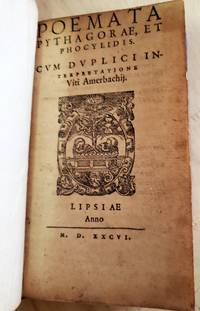
More Photos
POEMATA PYTHAGORAE, ET PHOCYLIDIS: Cvm Dvplici Interpretatione Viti Amerbachij
by Pythagorae; Pythagoras
- Used
- near fine
- Hardcover
- Condition
- Used - Near Fine
- Edition
- Reprint
- Binding
- Hardcover
- Quantity Available
- 1
- Seller
-
Hopkins, Minnesota, United States
- Item Price
-
SGD 413.79
Show Details
Description:
Lipsiae [Leipzig], 1586. Reprint . Hardcover. Near Fine. Publication date "M. D. XXCVI." Professionally rebound in brown boards with the spine stamped in black. Text block is browned and appears cut-down slightly from original size. Unmarked. Text is in Latin. A Very pretty copy. 134 p. plus 5 more printed pages and two blank leaves. 3 5/8 x 5 15/16 inches. I believe that this book was rebound in the early twentieth century. See Pictures.
Item Price
SGD 413.79
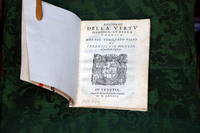
More Photos
Discorso della virtù heroica, et della charità.as Sig. Monsig. il Cardinale Cesareo.
by Tasso Torquato
- Used
- Condition
- Used - ottimo
- Edition
- prima edizione
- Quantity Available
- 1
- Seller
-
Arezzo, Italy
- Item Price
-
SGD 528.95
Show Details
Description:
Venetia: Bernardo Giunti. [Giunti-Tasso-Prima Edizione] (cm.20) brossura antica restaurata con foglio di antifonario con musica, sguardie antiche.-- cc. 10. Grande marca al frontis, carattere rotondo, grande capolettera figurato. Edizione originale molto rara. Manca a Choix ed Adams. Il Census Iccu registra solo 9 copie nelle Biblioteche Italiane. L' operetta affronta varie facoltà morali e materiali dell' uomo. Esemplare molto bello e fresco. * Camerini II p.465 n° 16; * Graesse VII 39; * Parenti 482; * Raccolta Tassiana " A.Mai " n° 1434; * Bm. Stc. 660.[f56] . ottimo. Rilegato. prima edizione. 1582.
Item Price
SGD 528.95

More Photos
Sexti Pompei Festi De verborum significatione fragmentum. Ex vetustissimo exemplari Bibliothecae Farnesianae descriptum. Schedae quae Festi fragmento detractae apud Pomponium Laetum extabant. Ex bibliotheca Fulvi Ursini. Notae in Sex. Pompei Festi fragmentum, schedas & epitomam.
by FESTUS & M. VERRIUS FLACCUS
- Used
- Hardcover
- Condition
- Used
- Binding
- Hardcover
- Quantity Available
- 1
- Seller
-
AMSTERDAM, Netherlands
- Item Price
-
SGD 734.65
Show Details
Description:
(Genève), apud Petrum Santandreanum, 1583. 8vo. (1),196,(18),62 p. Vellum 17 cm (Ref: 1 GLN 3005; Schweiger 2,354, Smitskamp 60) (Details: Six thongs laced through the joints. Veritas printer's device on the title: a woman, the naked truth, seated on a cubus, holding a radiant sun in her right hand; in her left hand she holds an opened book and a palm leaf; her feet rest on the globe; the garland of fruit which surrounds her shows a ribbon with the text in Greek: 'Alêtheia Pandamatôr', i.e. 'Allmighty Truth'). (Condition: Vellum partly soiled. Right margin of title slightly thumbed; title slightly browning) (Note: Festus is a 2nd century grammarian, who produced an abbreviation of a lexicographic work by Marcus Verrius Flaccus, a wellknown antiquarian and grammarian living in Augustan Rome. Verrius compiled an enormous lexicon in 80 books, full of unusual, difficult, and archaic words, with discussions about customs, political institutions, belief and Roman law.…
Read More Item Price
SGD 734.65
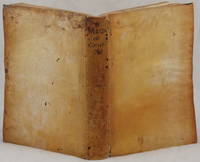
More Photos
CONSILIA SIVE RESPONSA
by Roberto Maranta
- Used
- Condition
- Used
- Quantity Available
- 1
- Seller
-
Foligno (PG), Italy
- Item Price
-
SGD 734.65
Show Details
Description:
VENETIIS: APUD JOANNEM BAPTISTAM SESSAM, 1591. In 4. Dim. 28x21,5 cm. Pp. (24)+180+(1)+68+(1). Rara opera del 1591 del giurista Roberto Maranta (1746-1530) nato a Venosa. Maranta si laureò a Napoli nel 102 e dedicò tutta la sua vita allo studio e pratica della legge. Lavorò e studiò a Salerno, Palermo e Napoli. L’opera sono una serie di consigli con risposta sulle materie giuridiche dell’alienazione e dei rimedi della possessione. Testo a doppia colonna e numerazione singola. In buone condizioni e completo. Belle vignette all'interno Copertina in piena pergamena coeva con titolo manoscritto al dorso in buone condizioni generali con lievi usure ai margini e dorso. Segni di tarlo (vedere foto). Legatura in buone condizioni. All'interno le pagine si presentano in buone condizioni con fioriture. Lievi gore d’umidità marginali. Parte mancante al frontespizio e alle pagine dalla 60 alla finale 68 con perdita di qualche porzione di lettera a pag.…
Read More Item Price
SGD 734.65

More Photos
CHRISTOPHORI LONGOLII EPISTOLARUM LIBRI IIII TULLIANAE VIDELICET ELOQUENTIAE AD UNGUEM EXPRESSA IMAGO
by Cristophe Longueil
- Used
- Condition
- Used
- Quantity Available
- 1
- Seller
-
Foligno (PG), Italy
- Item Price
-
SGD 734.65
Show Details
Description:
BASILEAE: APUD NIC. EPISCOPIUM IUN., 1558. In 16. Dim. 17x12 cm. Pp. 32 (n.n.)+350+2 (n.n.). Rara edizione del 1558 di quest'opera scritta da Cristophe Longueil (1488-1522) umanista francescano. Nel 1517 Longueil strinse amicizia con Pietro Bembo e Jacopo Sadoleto ma questo non impedì che nei suoi confronti si scatenasse una forte campagna diffamatoria tanto che fu costretto a trafserirsi a Padova dove si spense. Ammiratore incondizionato di Cicerone, fu un grande propagandista del ciceronismo prima in Francia, poi a Roma. Questo suo epistolario non è una mera imitazione della produzione ciceroniana, ma denota una ricerca stilistica ed un'eleganza espositiva di rara freschezza e vivacità. Nella prima parte la sua vita, poi l'epistolario. Numerose note manoscritte all'interno. Marca editoriale all'ultima carta. Titolo manoscritto al taglio inferiore. Opera collazionata e risultata completa. Legatura in pergamena. Non comune. Copertina in piena pergamena con…
Read More Item Price
SGD 734.65
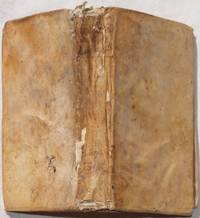
More Photos
ADRIANUS TT. S. CHRYSOGONI S. R. E. PRESBYTER CARDINALIS DE SERMONE LATINO ET MODIS LATINE LOQUENDI EIUSDEM VENATIO AD ASCANIUM CARDINALEM ITEM ITER IULII II PONTIFICIS ROM.
by Adriano Castellesi
- Used
- Signed
- Condition
- Used
- Quantity Available
- 1
- Seller
-
Foligno (PG), Italy
- Item Price
-
SGD 808.12
Show Details
Description:
LUGDUNI: APUD SEB. GRYPHIUM, 1548. In 16. Dim. 17x11 cm. Pp. 402+(14). Edizione del 1548 di questa nota opera letteraria scritta da Adriano Castellesi (ca 1485-1521) nato a Corneto (antico nome di Tarquinia) detto anche Adriano da Corneto. Castellesi fu grechista, ebraista, autore di poemetti, opere di stile, grammatiche e filosofico-teologiche. Espertissimo di affari, si arricchì enormemente destando in tal modo l'invidia di Cesare Borgia che tentò di avvelenarlo. Andato in esilio e ritornato in patria all'avvento di Leone X, dovette ritornarvi perchè accusato di aver preso parte alla congiura del Cardinale Petrucci. Da questo momento in poi non si sa più nulla di lui: sembra che sia stato assassinato a scopo di furto da uno dei suoi servitori. Il volume è un'opera didattica latina che riporta termini utilizzati in sentenze classiche latine. Alla fine risulta molto interessante il poema sulla caccia organizzata dal Cardinale Ascanio Sforza nei pressi…
Read More Item Price
SGD 808.12
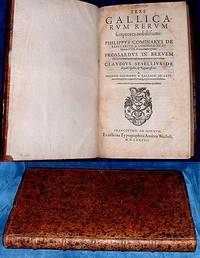
TRES GALLICARUM RERUM scriptores nobilissimi Philippus Cominaeus de rebus gestis a Ludovico XI et Carolo VIII Francorum regibus; Frossardus in brevem historiarum memorabilium epitomen contractus; Claudius Sesellius de republ. Galliae & Regum officiis. A Ioanne Sleidano e Gallico in Latinum sermonem conversi breviq[ue] explicatione illustrati.
by Commynes, Philippe de, Jean Froissart & Claude de Seissel trans. by Johannes Sleidanus (1506-1556)
- Used
- very good
- Hardcover
- first
- Condition
- Used - Very Good
- Binding
- Hardcover
- Quantity Available
- 1
- Seller
-
Blockley, Gloucestershire, United Kingdom
- Item Price
-
SGD 806.57
Show Details
Description:
Frankfurt: Andreas Wechel first edition, 1578. Hardcover. Very Good. Printer's mark of flying horse over cornucopia & hand from cloud holding caduceus to titlepage + same printer's mark slightly larger to verso of last leaf + floral, foliate & historiated head- & tail-piece & initials.. Folio handsome 18th century gilt ruled and sprinkled calf with 6 raised bands, the compartments & bands gilt but without a title on the spine (small chip out of head of spine/edges sl.rubbed). All edges sprinkled with red dye [8]pp prelims + 320pp + [28]pp index, publisher's imprint and large Wechel printer's mark. Some marginal damp marks to top corner but not affecting the strength and crispness of the paper nor the text. Name Fletcher to top of titlepage. A very few notes or marks to margin. *History of Louis XI & Charles VIII by de Commynes, shortened history of memorable events by Froissart and a further work, by de Seissel. Scarce volume of Medieval French history OCLC locates only 6 copies.
Item Price
SGD 806.57

HOMILIAE SIVE CONCIONES PRAESTANTISSIMORUM Ecclesiae Catholicae Doctorum, Primum ab Alcuino Levita iussu Imp. CAROLI MAGNI in hunc redactae ..
by Paulus Diaconus [Paul, the Deacon, ca. 720-799?] and others
- Used
- good
- Hardcover
- Condition
- Used - Good
- Binding
- Hardcover
- Quantity Available
- 1
- Seller
-
Blockley, Gloucestershire, United Kingdom
- Item Price
-
SGD 806.57
Show Details
Description:
Koln (Cologne): apud Maternum Cholinum, 1557. Hardcover. Good. Small woodcuts (40 with a few repeats mostly of biblical scenes) + a few historiated initials. . Folio flexible vellum with stubs of ties (some wrinkles /paper spine label & large old shelfmark B) Titlepage +[25pp]=dedication, indices, to reader & errata. +[1p]blank +5-704pp As listed on a4 the book collates !6 #4 a6 b4 c-z6 +A-Z6 +Aa-Mm6 +Nn7 (lacks Nn8=the final blank) Title has stamp of the library of P.P.Capuci & early "sum ex libris Leodegarj a Meggen Can. Beron." Another "Capucinorum in Sursee" also "loci Capu. in Schyfen". Three small pin sized worm holes to TP soon diminishing to one and then none after the first few pages of text. There are two corners torn away without loss, 4 marginal tears (only one into text and that without loss). And p 634 has a marginal paper fault, again not affecting text.Page 479/480 is bound before 477/478. There are a few gatherings that are browner and a few creases. A few ink splatters to about 6…
Read More Item Price
SGD 806.57
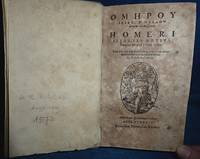
More Photos
ILIAS, SEU POTIUS, OMNIA EIUS QUAE EXTANT OPERA (preceded by title in Greek, ?�???? ?????, ? �????? ?pa?ta t? s???�e?a). Studio & cura Ob. Giphanii I.C. quam emendatissime edita, cum eiusdem scholijs & indicibus novis.
by Homer
- Used
- good
- Hardcover
- Condition
- Used - Good
- Binding
- Hardcover
- Quantity Available
- 1
- Seller
-
Blockley, Gloucestershire, United Kingdom
- Item Price
-
SGD 822.01
Show Details
Description:
Argentorati (Augsburg): Theodosius Rihelius, 1572 [from dedication]. Hardcover. Good. Woodcut printer's devices on title pages; woodcut initials. . Octavo (165x90mm) Vol. 1 only (of 2) original vellum with yapp edges title in old ink on spine 893+[73]pp Scolia & Index. Dedication dated XIIII. Kalend. Aprilis. A.D. 1572. Greek (text of H. Estienne) and Latin text of J. Crespin's edition, Geneva, 1560-67) on opposite pages throughout. Pages very browned thoughout but Latin & Greek text entirely legible. Referenced by Brunet III 272, Adams H764. Publisher Rihel was active 1560?-1619.
Item Price
SGD 822.01